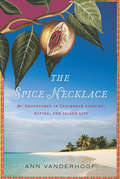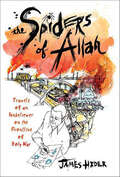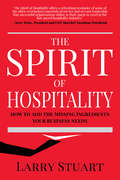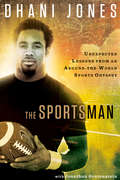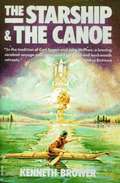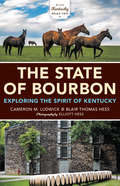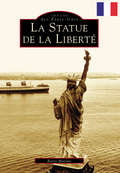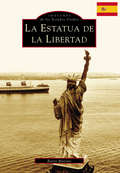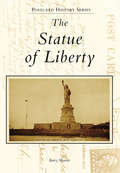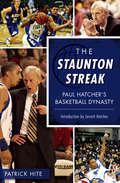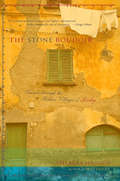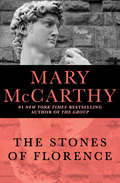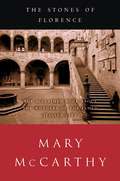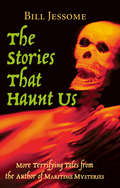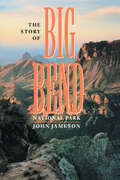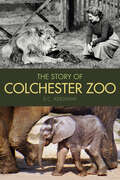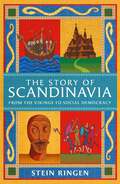- Table View
- List View
The Spice Necklace: My Adventures in Caribbean Cooking, Eating, and Island Life
by Ann VanderhoofThe author of An Embarrassment of Mangoes offers &“a mouthwatering slice of Caribbean culture&” in this blend of travel memoir and cookbook (New York Post). While sailing around the Caribbean, Ann Vanderhoof and her husband Steve track wild oregano-eating goats in the cactus-covered hills of the Dominican Republic, gather nutmegs on an old estate in Grenada, make searing-hot pepper sauce in a Trinidadian kitchen, cram for a chocolate-tasting test at the University of the West Indies, and sip moonshine straight out of hidden back-country stills. Along the way, they are befriended by a collection of unforgettable island characters: Dwight, the skin-diving fisherman who always brings them something from his catch and critiques their efforts to cook it; Greta, who harvests sea moss on St. Lucia and turns it into potent Island-Viagra; sweet-hand Pat, who dispenses hugs and impromptu dance lessons along with cooking tips in her Port of Spain kitchen. Back in her galley, Ann practices making curry like a Trini, dog sauce like a Martiniquais, and coo-coo like a Carriacouan. And for those who want to take these adventures into their own kitchens, she pulls 71 delicious recipes from the stories she tells, which she places at the end of the relevant chapters. The Spice Necklace is a wonderful escape into a life filled with sunshine (and hurricanes), delicious food, irreplaceable company, and island traditions.
The Spiders of Allah: Travels of an Unbeliever on the Frontline of Holy War
by James HiderIn his fascinating, terrifying and often very funny book, James Hider takes his doubts about religious beliefs straight into the dark heart of the world's holy wars—from Israel to Gaza to Iraq—the birthplace that spawned so many faiths—and then back to Jerusalem. From hardcore Zionist settlers still fighting ancient Biblical battles in the hills of the West Bank to Shiite death squads roaming the lawless streets of Iraq in the aftermath of Saddam; whether it's the misappropriation and martyrdom of Mickey Mouse by Gaza's Islamists, or a US president acting on God's orders, Hider sees the hallucinatory effect of what he calls the 'crack cocaine of fanatical fundamentalism' all around him. As he meets terrorists, suicide bombers, soldiers, ayatollahs, clerics, and ordinary and extraordinary people alike, the question that sparked his journey continues to plague his thoughts: how can people not only believe in this madness, but die and kill for it too? This extraordinary and timely book takes the God Delusion debate onto the streets of the Middle East. It casts an unflinching yet compassionate eye on the very worst and most violent crimes committed in the name of religion, and then sharply asks the questions the world needs to answer if we are ever to stand a chance of facing our own worst demons.
The Spies
by Luís Fernando VeríssimoA frustrated publisher receives a mysterious angst-ridden manuscript: 'a friend' must send it in installments; its contents would put the author in danger. As he pieces together the story, he learns that the author is the wife of one of the two Martelli brothers - gangsters who dominate a small town in the Brazilian interior. Surely her dark outpourings are a cry for help? One by one, he dispatches his motley collection of friends to Frondosa - a town totally obsessed with five-a-side football - to investigate and to bring her to safety.
The Spirit of Hospitality: How to Add the Missing Ingredients Your Business Needs
by Larry StuartThe Spirit of Hospitality takes readers on a journey of passion for purpose that empowers the missing ingredients of hospitality into a proven leadership style that works. Time has sped up to the point where technology has surpassed the last few thousand years by only a generation. What happened to kindness, humility and the human touch vs. having our face buried into a laptop or IPhone? A life dedicated to excellence does not come by chance, or with age, but by choice and commitment. Larry Stuart strives to give The Spirit of Hospitality to others who are called to a life of prosperity and significance. He provides the tools, attributes and real-life examples of what works when it comes to serving up a memorable guest service delivery and describes the necessary ingredients of hospitality. There is hope only if individuals bring back the missing ingredients of kindness, humility, integrity, encouragement, generosity, team and accountability. Only then is the spirit of hospitality empowered to provide the right leadership approach in building relationships to a new level of expectation, and allows those who embrace that spirit to accomplish whatever they strive to achieve.
The Sportsman: Unexpected Lessons from an Around-the-World Sports Odyssey
by Jonathan Grotenstein Dhani JonesWith 11 seasons in the NFL, Dhani Jones had an unusually long career for a football player. But early on, Dhani thought his playing days were over. Cut by the Eagles and the Saints, he was at a professional crossroads. When the Bengals called, though, he was more than ready and in the best shape of his life. And for that, he credits his off-season.The Sportsman follows Dhani's discovery that the parts of his life, which to many seemed to be distractions—including an off-season TV show that sent him around the world to learn and compete in other sports—actually served to cross-train him in ways he'd never imagined, enabling him to become more grounded, globally aware, and, most surprisingly, a much better football player.Part travelogue, part workout guide, part inspirational memoir, The Sportsman is an invigorating account of Dhani's global sporting adventures and the lessons he learned along the way. From dragon boat racing in Singapore to carrying 300-pound rocks in Iceland and biking in Italy, Dhani's adventures taught him to be tougher, smarter, and stronger than ever. The Sportsman is a reminder that by connecting to the world through its people and customs and the spirit of competition, we empower ourselves in ways that can surpass our craziest expectations.
The Starship and the Canoe
by Kenneth BrowerThe story of a father and son who search for life's meaning in very different ways. "In the tradition of Carl Sagan and John McPhee, a bracing cerebral voyage past intergalactic hoopla and backwoods retreats. "--Kirkus Reviews
The State of Bourbon: Exploring the Spirit of Kentucky
by Blair Thomas Hess Cameron M. Ludwick Elliott HessWelcome to Kentucky, where bourbon barrels outnumber residents. After all, bourbon is Kentucky—its craftsmanship and flavors cannot be separated from the culture and history of the state. Discover that culture and history—and enjoy great food, fabulous drinks, and incredible people—on your own Kentucky bourbon road trip. The State of Bourbon showcases the region's finest distilleries as well as the local restaurants, hotels, parks, and adventures that every bourbon lover needs to experience. Bluegrass natives Cameron M. Ludwick and Blair Thomas Hess highlight some of their favorite stops on the Kentucky Bourbon Trail, the Urban Bourbon Trail, and the Craft Bourbon Trail, at stills and rick houses where the history and heritage of the nation's only native spirit come to life. Not just a trail or tasting guide, The State of Bourbon will lead you across Kentucky, through the history of the spirit, and into your own bourbon adventure.
The Station Agent and the American Railroad Experience (Railroads Past and Present)
by H. Roger GrantBefore the widespread popularity of automobiles, buses, and trucks, freight and passenger trains bound the nation together. The Station Agent and the American Railroad Experience explores the role of local frontline workers that kept the country's vast rail network running.Virtually every community with a railroad connection had a depot and an agent. These men and occasionally women became the official representatives of their companies and were highly respected. They met the public when they sold tickets, planned travel itineraries, and reported freight and express shipments. Additionally, their first-hand knowledge of Morse code made them the most informed in town. But as times changed, so did the role of, and the need for, the station agent.Beautifully illustrated with dozens of vintage photographs, The Station Agent and the American Railroad Experience, brings back to life the day-to-day experience of the station agent and captures the evolution of railroad operations as technology advanced.
The Statue of Liberty (Images of America)
by Barry MorenoEn tant que monument le plus profond représentant la liberté et l’indépendance des États-Unis, La Statue de la Liberté domine le Port de New York depuis des décennies. Son regard fixe a vu le pays croître d’un simple observateur des affaires mondiales à la nation la plus puissante du monde. Son bras levé a salué de nombreux bateaux alors qu’ils passaient. Sa dignité a accueilli des Américains lorsqu’ils rentraient de l’étranger et elle a donné de l’espoir aux nouveaux venus à la recherche d’une nouvelle vie dans le pays de la liberté.
The Statue of Liberty (Images of America)
by Barry MorenoComo el monumento estadounidense que mejor representa la libertad y la independencia, la Estatua de la Libertad ha vigilado el Puerto de Nueva York desde hace décadas. Su firme mirada ha visto crecer al país desde sus días de mero observador de los asuntos mundiales, hasta su constitución en la nación más poderosa en el mundo. Su brazo levantado ha saludado a los innumerables barcos que han pasado frente a ella. Su grandeza ha dado la bienvenida tanto a los estadounidenses que regresaban a su hogar y ha dado esperanza a los recién llegados que iban en busca de un nuevo comienzo en el país de la libertad.
The Statue of Liberty (Postcard History Series)
by Barry MorenoThe world’s most famous sculpture, the Statue of Liberty, Liberty Enlightening the World, rises to a height of 305 feet from the base of her pedestal to the top of the golden flame of her torch. Conceived, designed, and originally built in France, she was unveiled on her new island home in 1886. The postcard trade, still in its infancy, embraced the icon, and Miss Liberty’s commanding figure soon appeared on millions of postcards. In this book, one will see the statue from many angles—profiles, long shots, close-ups, aerials, torch views, and more.
The Staunton Streak: Paul Hatcher’s Basketball Dynasty (Sports)
by Jarrett Hatcher Patrick HitePaul Hatcher won 897 games as the head coach of the Robert E. Lee High School boys' basketball team in Staunton. Astoundingly, he won 85 in a row from 2003 to 2006. In a career spanning forty-three years, Hatcher won four state titles, was named coach of the year an amazing eleven times and is a member of five halls of fame. The beloved mentor also developed nationally recognized talent like Kevin Madden and Tyler Crawford. Author and journalist Patrick Hite presents the dramatic story of a legend in high school basketball history.
The Stone Boudoir: Travels through the Hidden Villages of Sicily
by Theresa MaggioIn this sparkling book, Theresa Maggio takes us on a journey in search of Sicily's most remote and least explored mountain towns. Using her grandparents' ancestral village of Santa Margherita Belice as her base camp, she pores over old maps to plot her adventure, selecting as her targets the smallest dots with the most appealing names. Whether she's writing about the unique pleasures of Sicilian street food, the damage wrought by molten lava, the ancient traditions of Sicilian bagpipers, or the religious processions that consume entire villages for days on end, Maggio succeeds in transporting readers to a wholly unfamiliar world, where almonds flower in February and the water tastes of stone. A beautifully wrought meditation on time and place, The Stone Boudoir will be cherished by all who love fine travel writing.
The Stone Carvers
by Jane UrquhartSet in the first half of the twentieth century, but reaching back to Bavaria in the late nineteenth century, The Stone Carvers weaves together the story of ordinary lives marked by obsession and transformed by art. At the centre of a large cast of characters is Klara Becker, the granddaughter of a master carver, a seamstress haunted by a love affair cut short by the First World War, and by the frequent disappearances of her brother Tilman, afflicted since childhood with wanderlust. From Ontario, they are swept into a colossal venture in Europe years later, as Toronto sculptor Walter Allward's ambitious plans begin to take shape for a war memorial at Vimy, France. Spanning three decades, and moving from a German-settled village in Ontario to Europe after the Great War, The Stone Carvers follows the paths of immigrants, labourers, and dreamers. Vivid, dark, redemptive, this is novel of great beauty and power.
The Stones of Florence
by Mary McCarthyA journey through the glorious Italian city&’s scenery, history, and culture, from the New York Times–bestselling author of Venice Observed and The Group. Mary McCarthy&’s classic celebrates the Italian city often looked upon as the provincial sister to the better-dressed, more &“feminine&” Venice. To McCarthy, Florence, or Firenze, is a place of ageless enchantment, from the Duomo to the fortressed palaces. The Renaissance began here; art and architecture flourished. From its roots as a center of medieval trade to its transformation into one of the world&’s wealthiest cities, McCarthy charts Florence&’s rich and turbulent history. She introduces a cast of towering real-life characters. Through her probing writer&’s lens, the poetry of Dante and the magnificent artistry of Raphael and Botticelli come vibrantly alive. Along this illuminating journey, McCarthy offers fascinating bits of trivia: There are no ruins in Florence because the Florentines aren&’t sentimental about their past; America took its name from a Florentine traveler named Amerigo Vespucci. From Michelangelo to the Medicis to the story behind a statue&’s missing head, The Stones of Florence is Mary McCarthy&’s hymn to this unique city. This ebook features an illustrated biography of Mary McCarthy including rare images from the author&’s estate.
The Stones of Florence
by Mary MccarthyThis is a unique tribute to Florence, combining history, artistic description, and social observation. A memorable portrait of the Florentine spirit and of those figures who exemplify this spirit, such as Dante, Michelangelo, Brunelleschi, Donatello, and Machiavelli.
The Stones of Florence
by Mary MccarthyA tribute to the author's beloved Florence, blending history, artistic reflection, and keen social observation.Renowned for her sharp literary style, essayist and fiction writer Mary McCarthy offers a unique history of Florence. From its inception to the dominant role it came to play in the world of art, architecture, and Italian culture, McCarthy captures the brilliant Florentine spirit and revisits the legendary figures Dante, Michelangelo, Machiavelli, and others who exemplify it so iconically. Her most cherished sights and experiences color this timeless portrait of a city that is as famous as it is alluring."Mary McCarthy...may be writing the most stimulating guidebooks of our time."--Lincoln Kirstein, The Nation"Miss McCarthy is not only well versed in the subject but her taste is sure and her style--cool, astringently witty, yet eloquent--seems tailor-made for depicting the brilliant, mercurial, skeptical Florentines....no student of the Renaissance should be without The Stones of Florence."--Carlo Beuf, The New York Times Book Review"A solid tribute to the city and its people past and present, an estimate achieved without the least sentimentality, and free of solemn artiness."--William D. Patterson, Saturday Review Syndicate
The Stones of Florence: The Stones Of Florence And Venice Observed (Kiwi Ser. #375)
by Mary McCarthyA journey through the glorious Italian city&’s scenery, history, and culture, from the New York Times–bestselling author of Venice Observed and The Group. Mary McCarthy&’s classic celebrates the Italian city often looked upon as the provincial sister to the better-dressed, more &“feminine&” Venice. To McCarthy, Florence, or Firenze, is a place of ageless enchantment, from the Duomo to the fortressed palaces. The Renaissance began here; art and architecture flourished. From its roots as a center of medieval trade to its transformation into one of the world&’s wealthiest cities, McCarthy charts Florence&’s rich and turbulent history. She introduces a cast of towering real-life characters. Through her probing writer&’s lens, the poetry of Dante and the magnificent artistry of Raphael and Botticelli come vibrantly alive. Along this illuminating journey, McCarthy offers fascinating bits of trivia: There are no ruins in Florence because the Florentines aren&’t sentimental about their past; America took its name from a Florentine traveler named Amerigo Vespucci. From Michelangelo to the Medicis to the story behind a statue&’s missing head, The Stones of Florence is Mary McCarthy&’s hymn to this unique city. This ebook features an illustrated biography of Mary McCarthy including rare images from the author&’s estate.
The Stories That Haunt Us: More Terrifying Tales from the Author of Maritime Mysteries
by Bill JessomeLegends and lore from Canada&’s rugged Maritime provinces, shrouded in the mists of the Atlantic Ocean . . . From the host of TV&’s Maritime Mysteries, this book includes forty of the best stories collected from around the Maritimes. Using his journalist&’s skills, Bill Jessome weaves incredible stories that both charm us and chill us. The region including Nova Scotia, Prince Edward Island, and New Brunswick has an extensive storytelling tradition and a large part of that lexicon consists of tales of the supernatural. Many of these stories are passed down over the generations, and Jessome has acquired dozens of haunting accounts by listening to Maritimers at the kitchen table, around the flickering campfire, and when the moon is full. Includes illustrations
The Story of Big Bend National Park
by John JamesonA breathtaking country of rugged mountain peaks, uninhabited desert, and spectacular river canyons, Big Bend is one of the United States' most remote national parks and among Texas' most popular tourist attractions. Located in the great bend of the Rio Grande that separates Texas and Mexico, the park comprises some 800,000 acres, an area larger than the state of Rhode Island, and draws over 300,000 visitors each year. The Story of Big Bend National Park offers a comprehensive, highly readable history of the park from before its founding in 1944 up to the present. John Jameson opens with a fascinating look at the mighty efforts involved in persuading Washington officials and local landowners that such a park was needed. He details how money was raised and land acquired, as well as how the park was publicized and developed for visitors. Moving into the present, he discusses such issues as natural resource management, predator protection in the park, and challenges to land, water, and air. Along the way, he paints colorful portraits of many individuals, from area residents to park rangers to Lady Bird Johnson, whose 1966 float trip down the Rio Grande brought the park to national attention. This history will be required reading for all visitors and prospective visitors to Big Bend National Park. For everyone concerned about our national parks, it makes a persuasive case for continued funding and wise stewardship of the parks as they face the twin pressures of skyrocketing attendance and declining budgets.
The Story of Big Bend National Park
by John JamesonThe history of the first national park in Texas—the politics, intrigues, controversies, and the people inspired by the stunning desert environment. A breathtaking country of rugged mountain peaks, uninhabited desert, and spectacular river canyons, Big Bend is one of the United States&’ most remote national parks and among Texas&’ most popular tourist attractions. Located in the great bend of the Rio Grande that separates Texas and Mexico, the park comprises some 800,000 acres, an area larger than the state of Rhode Island, and draws over 300,000 visitors each year. The Story of Big Bend National Park offers a comprehensive, highly readable history of the park from before its founding in 1944 up to the present. John Jameson opens with a fascinating look at the mighty efforts involved in persuading Washington officials and local landowners that such a park was needed. He details how money was raised and land acquired, as well as how the park was publicized and developed for visitors. Moving into the present, he discusses such issues as natural resource management, predator protection in the park, and challenges to land, water, and air. Along the way, he paints colorful portraits of many individuals, from area residents to park rangers to Lady Bird Johnson, whose 1966 float trip down the Rio Grande brought the park to national attention. This history will be required reading for all visitors and prospective visitors to Big Bend National Park. For everyone concerned about our national parks, it makes a persuasive case for continued funding and wise stewardship of the parks as they face the twin pressures of skyrocketing attendance and declining budgets.
The Story of Colchester Zoo
by S. C. KershawColchester Zoo is today one of the finest zoos in Britain. Yet, unlike almost every other major zoo in the country, Colchester Zoo has never had its story told – until now. The forgotten figures of Frank and Helena Farrar are here brought to life once again in these pages which show how they founded firstly Southport Zoo in the 1950s and then Colchester Zoo in the 1960s. Told here is the story of how Frank and Helena’s domestic life with their lions and monkeys prompted them to embark on a series of adventures which took them all over the world. Also told is the story of how Colchester Zoo declined in the 1970s and how the Tropeano family turned it into the internationally respected breeding centre for endangered animals that it is today. This is a tale of struggle and heartbreak but also of transformation and redemption, and is a fitting tribute to one of our great animal institutions as it reaches its fiftieth anniversary.
The Story of Flight
by Jakob WhitfieldA beautifully illustrated history of the iconic flying machines that have helped us soar through the skies. Perfect for child and adult aviation fans alike!The story of flight is a fascinating one: from the earliest balloons and airships to the latest stealth jet, each breakthrough laid the foundation for the next. Trace the extraordinary history of flight in this strikingly illustrated guide, from the Wright Flyer to cutting-edge drones. Along the way, discover how the social upheavals of the past 240 years influenced the flight path: two world wars, equality for women and the fight against climate change. Finally, explore the incredible inventions that await us in the future.Also available in this series on transport is The Story of the Car.
The Story of Scandinavia: From the Vikings to Social Democracy
by Stein RingenIn The Story of Scandinavia, political scholar Stein Ringen chronicles more than 1,200 years of drama, economic rise and fall, crises, kings and queens, war, peace, language and culture. Scandinavian history has been one of dramatic discontinuities of collapse and restarts, from the Viking Age to the Age of Perpetual War to the modern age today. For a thousand years, the Scandinavian countries were kingdoms of repression where monarchs played at the game of being European powers, at the expense of their own populations.The brand we now know as "Scandinavia" is a recent invention. During most of its history, Denmark and Sweden, and to some degree Norway, were bloody enemies. These sentiments of enmity have not been fully settled. Under the surface of collaboration remain undercurrents of hatred, envy, contempt and pity. What does it mean today to be Scandinavian? For the author, whose identity is Scandinavian but his life European, this masterly history is a personal exploration as well as a narrative of compelling scope.
The Story of Scandinavia: From the Vikings to Social Democracy
by Stein RingenIn The Story of Scandinavia, political scholar Stein Ringen chronicles more than 1,200 years of drama, economic rise and fall, crises, kings and queens, war, peace, language and culture. Scandinavian history has been one of dramatic discontinuities of collapse and restarts, from the Viking Age to the Age of Perpetual War to the modern age today. For a thousand years, the Scandinavian countries were kingdoms of repression where monarchs played at the game of being European powers, at the expense of their own populations.The brand we now know as "Scandinavia" is a recent invention. During most of its history, Denmark and Sweden, and to some degree Norway, were bloody enemies. These sentiments of enmity have not been fully settled. Under the surface of collaboration remain undercurrents of hatred, envy, contempt and pity. What does it mean today to be Scandinavian? For the author, whose identity is Scandinavian but his life European, this masterly history is a personal exploration as well as a narrative of compelling scope.
